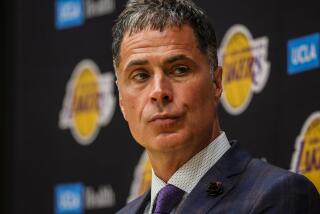Bryant Not Working With a Secret Agent
- Share via
He sits beside him listening to $100-million sales pitches, walks behind him entering the courtroom and, insiders say, was the first person to get a phone call last summer after his most famous client was confronted with sexual assault allegations by police in Eagle, Colo.
Kobe Bryant, it seems, always takes the spotlight, but Rob Pelinka is slowly stepping out of the shadows in his role as agent and confidant to one of basketball’s marquee attractions.
Pelinka, a reserve who played on Michigan’s “Fab Five” teams, became Bryant’s primary representative more than two years ago and is now deep into a business he once described as “sleazy and slimy.”
A former law student who graduated with honors and averaged 2.6 points in 119 career games for Michigan, Pelinka works for Los Angeles-based SFX Sports and includes Bryant, Clipper guard Corey Maggette and Toronto forward Morris Peterson among his clients.
Pelinka also represented Carlos Boozer until parting company Monday after a national sports debate on fairness and accountability involving an apparent agreement gone awry between Boozer, Pelinka and the Cleveland Cavaliers.
Pelinka, 34, became Bryant’s lead representative after acquiring those duties from Arn Tellem, who hired Pelinka more than five years ago. Pelinka still works with Tellem at SFX Sports.
Quiet and reserved in public, Pelinka is the tall, thin, well-dressed, dark-haired fellow who often walks behind Bryant and attorney Pamela Mackey into court in Eagle, Colo.
His nearly anonymous public posture belies his closeness with Bryant.
Pelinka was there with Bryant at a news conference at Staples Center last July when the Laker star, his wife by his side, acknowledged adultery and addressed allegations of rape made by a Colorado resort employee.
Despite his growing portfolio of clients, Pelinka has remained beholden to Bryant since they became intertwined in the summer of 2002. With a year left on Bryant’s endorsement deal with Adidas, the cornerstone of Tellem’s marketing strategy, Pelinka terminated it, ultimately agreeing to a reported $40-million Nike deal after a year of strenuous negotiations, according to officials at two companies that were involved.
Nike officials made the deal despite being annoyed by Pelinka’s conduct during a meeting with Chief Executive Phil Knight.
“He really talked down to Phil in the meeting,” a Nike executive said.
More recently, acting on behalf of Bryant, Pelinka reportedly called Mike Krzyzewski during the NBA Finals to gauge his interest in leaving Duke to coach the Lakers.
At a news conference Saturday to introduce Rudy Tomjanovich, the new Laker coach answered questions about Bryant by saying he had tried to contact Pelinka and had passed along a letter and videotape to Bryant. On the tape were clips of former Houston guards Steve Francis and Cuttino Mobley, an attempt to show Bryant how he would be incorporated in Tomjanovich’s offense.
Pelinka rarely returns phone calls to the media, but he will politely take reporters’ business cards when he meets them, nodding his head and exchanging pleasantries. Pelinka did not return calls for this article, but he said in an interview in March that he viewed his career choice as a challenge.
“Some people said to me, ‘Why do you want to get into a business with such a tarnished reputation?’ ” Pelinka told the Ann Arbor (Mich.) News. “I looked at it as a challenge of going into that business and being a person of integrity. I was determined to make a difference in people’s lives. I look at myself as being someone who has integrity and honesty, and I want to bring that to these relationships.”
Recently, however, Pelinka and former client Boozer have been portrayed by critics as greedy and deceitful.
Before the free-agency period began July 1, the Cavaliers apparently felt they had an oral agreement in place for a six-year, $41-million deal with Boozer. They therefore declined to execute a team option for a third year on his deal that would have paid him $695,000 next season.
But a few days later, Boozer reportedly agreed to a six-year, $68-million offer from the Utah Jazz.
Cavalier officials were incensed, but they could not go public with their frustrations because the NBA prohibits teams from conducting secret negotiations contingent on promises to players.
If Boozer signs the offer sheet from Utah, the Cavaliers have 15 days to match the offer, but to do so would lead to a roster shake-up to stay below the league’s salary cap. To make it harder on the Cavaliers, Utah reportedly has front-loaded the offer to give Boozer a larger chunk of his salary next season.
Several of Pelinka’s peers spoke out on the situation, fearful that the controversy could change future negotiations and might further stain the already-sullied image of sports agents.
“I have no idea what the true factual circumstances are involving Boozer, Cleveland and Utah, but in our field part of the glue that has held our industry together has been a series of oral promises and personal relationships that operate in a way that would be unheard of in any other field,” pro football agent Leigh Steinberg said.
Baseball agent John Boggs, who represents Chicago Cub pitcher Mark Prior and former San Diego Padre outfielder Tony Gwynn, said the fallout could set a new standard of caution and mistrust.
“Sometimes these things set a precedent,” Boggs said. “Not knowing all the information, obviously this player felt good about the organization and the organization felt good about him. They took a chance that everything would work out and in this case, it backfired in front of them.”
Details on the split between Pelinka and Boozer are murky. Some reports had SFX pressuring Pelinka to resign because the agency was worried about its reputation to conduct good-faith negotiations in the future. Others said Cleveland General Manager Jim Paxson called for Pelinka to resign as Boozer’s representative.
Boozer, who two weeks ago said he wanted to stay in Cleveland, remained silent until Monday, when he defended Pelinka and blamed the Cavaliers.
“Rob Pelinka didn’t do anything wrong, and I didn’t do anything wrong,” Boozer told the Plain Dealer newspaper. “He’s taken a lot of heat for something he doesn’t need to take heat for. This is the Cavs’ mistake. The Cavs created this.”
More to Read
Get our high school sports newsletter
Prep Rally is devoted to the SoCal high school sports experience, bringing you scores, stories and a behind-the-scenes look at what makes prep sports so popular.
You may occasionally receive promotional content from the Los Angeles Times.







